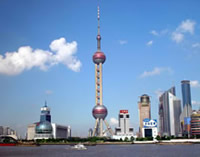|
|


ADVERTISEMENT
Buy Your own advertising
spaces!
.
Download Adobe Acrobat Reader to open [PDF] files.
Recent Visitors
Shanghai’s Expo May Be Economic Winner
2010. 3 May
Stephanie Wong, Sophie Leung, Irene Shen. Editors: John Liu, Paul Panckhurst The exhibition runs for the next six months, 10 times longer than the games, and is forecast by the organizers to draw 10 times as many visitors. When guests from French President Nicolas Sarkozy to North Korean deputy leader Kim Yong Nam have gone home, the event will leave Shanghai with an additional
(businessweek.com)
Bloomberg -- Shanghai’s $44 billion World Expo may secure bigger economic benefits for China’s richest city than Beijing reaped from the Olympics two years ago.
“The World Expo will accelerate Shanghai’s infrastructure development by 20 years,” said James McGregor, a senior counselor in Beijing at public-affairs company APCO Worldwide and author of the book “One Billion Customers.” “This may be a better economic proposition than the Olympics.”
Shanghai is wagering that the event, opened by President Hu Jintao on April 30, will cement a reputation as a premier destination and as a financial center after already surpassing Hong Kong’s economy in size last year. General Electric Co., BP Plc, Coca Cola Co. and Johnson & Johnson are sponsors as the city of 20 million hosts the five-yearly event.
The economic benefit may be 79.5 billion yuan ($11.6 billion), or about 3.5 times Beijing’s gain, according to Chen Xinkang, a professor of marketing and business management at the Shanghai University of Finance and Economics.
World expos began with the 1851 World’s Fair in London’s Crystal Palace and showcased the wealth and technological prowess of Europe’s industrialized nations.
Eiffel Tower
They’ve led to the building of structures including Paris’s Eiffel Tower and Seattle’s Space Needle. The events are now divided into so-called Universal Expos, such as in Shanghai, and smaller, more-specialized exhibitions.
Shanghai won hosting rights in 2002, allotting 28.6 billion yuan for construction and operating costs and 270 billion yuan for infrastructure, including two airport terminals and a three- year renovation of the historic riverside Bund.
In comparison, Beijing spent 280 billion yuan on infrastructure for the Olympics, while Japan’s Aichi Prefecture spent about $3 billion hosting the 2005 World Expo.
The event hasn’t always been a financial success. No U.S. city has hosted since 1984 in New Orleans, the only time an expo declared bankruptcy during its run, according to Expomuseum, a website that charts the history of the fairs.
Chen is confident of the benefits for Shanghai.
“The Expo offers an opportunity for the city to transit from a manufacturing economy to a higher-valued service economy,” the academic said.
Little Mermaid
The main attractions are pavilions of cultural and corporate displays, almost all paid for by the nations and companies they represent. Denmark has shipped across the bronze Little Mermaid statue.
Hosting is not without a variety of costs. As workers tore up roads and 24-hour-a-day construction kicked up dust and fouled the air, locals took to calling the event “The Idiot Expo.” In addition, dissidents face a crackdown from authorities nervous of anything spoiling the show, said Wang Songlian, a spokeswoman for the activist group Chinese Human Rights Defenders.
While the Olympics drew 6.52 million tourists, according to the organizers, Shanghai forecasts an influx of 70 million visitors, which may result in 46.9 billion yuan of direct consumption, according to Chen, the professor. Television and radio campaigns are telling residents to stand in line, help visitors and, please, don’t spit.
‘So Much at Stake’
The expo is “fast-forwarding investment in Shanghai,” said Jinny Yan, an economist for Standard Chartered Plc in the city. “They really can’t afford for things to go wrong because so much is at stake.”
The revamp of the Bund, which housed the offices of HSBC Holdings Plc and Standard Chartered Bank in the early 1900s, underscores the central government’s goal of the city becoming an international financial center “commensurate” with China’s economy, the world’s third biggest, by 2020.
While Shanghai can’t yet compare with New York or London and is also handicapped by China’s controls on its currency and the movement of capital, the city’s advantage is rapid growth, which is “certainly” outpacing that of those two places, Mayor Han Zheng said in an interview last year.
Shanghai’s gross domestic product grew 8.2 percent last year. In comparison, New York City’s expanded 0.9 percent in the fourth quarter after seven straight quarterly declines.
Roads, Airports
Infrastructure spending spurred by the expo could reap a 10-fold return as improved roads, airports and public transportation lure corporate investment, said Lu Hongjun, president of the Shanghai Institute of International Finance at the Pudong Continuing Education Center of Shanghai Higher Education.
Since the city won the right to stage the event, its urban metro system has expanded more than six times to 420 kilometers, government figures show. Tunnels for automobile traffic under the Huangpu river increased to 12 from two.
“Shanghai was like a big construction site,” said John Tan, head of Standard Chartered’s global market division in China, whose office is in Shanghai’s Lujiazui financial district. “The city and its residents took the short-term pain and now Shanghai is in much better shape than before.”
To contact the editors responsible for this story: Bruce Grant at bruceg@bloomberg.net Chris Anstey at canstey@bloomberg.net
Source: www.businessweek.com

